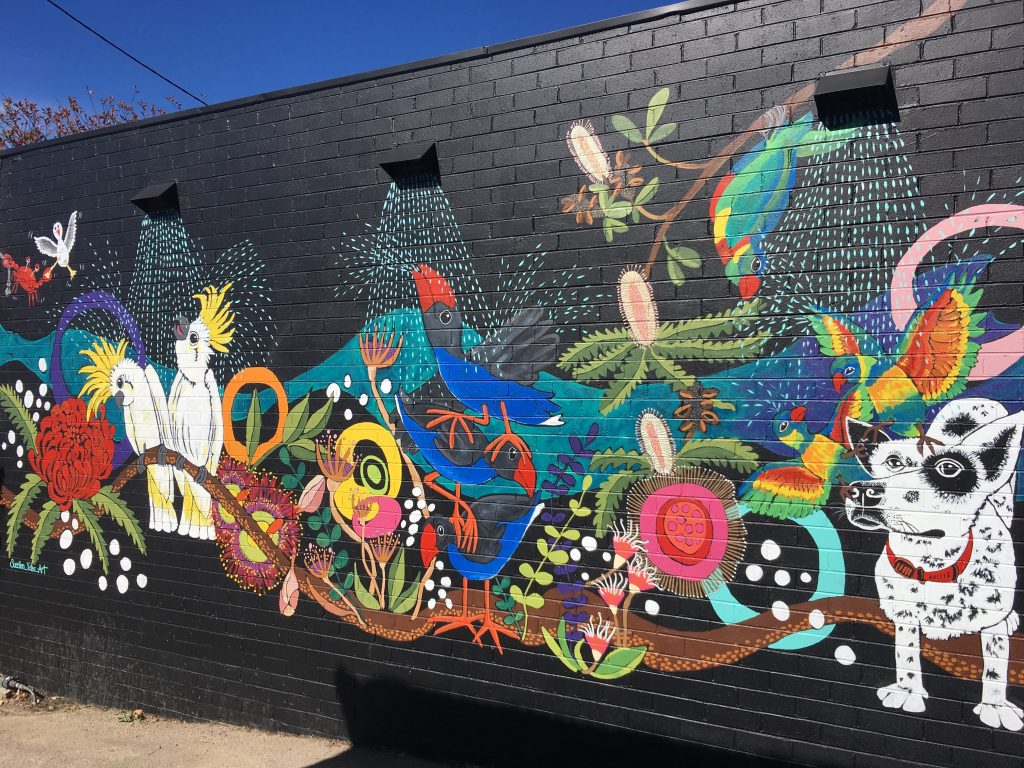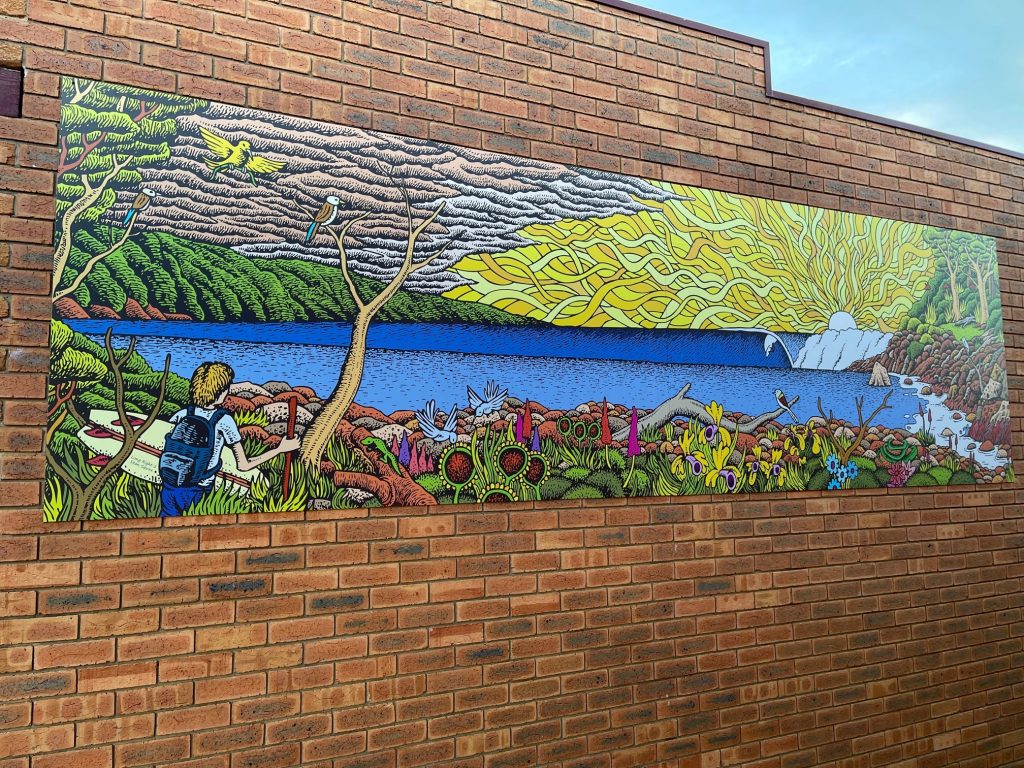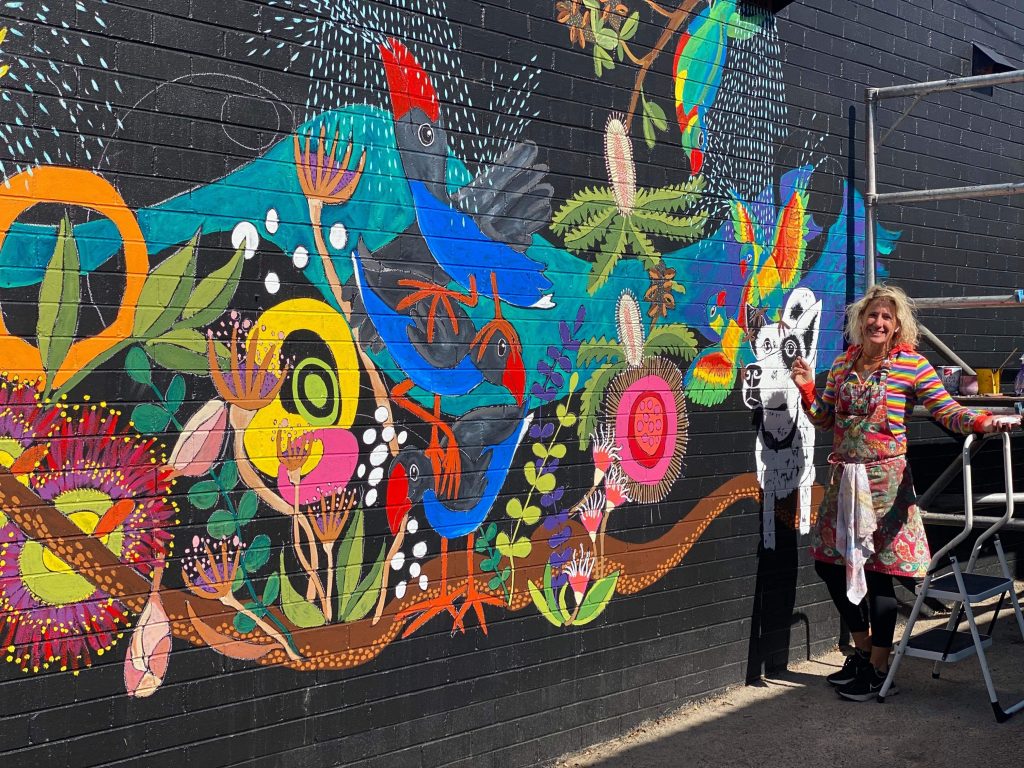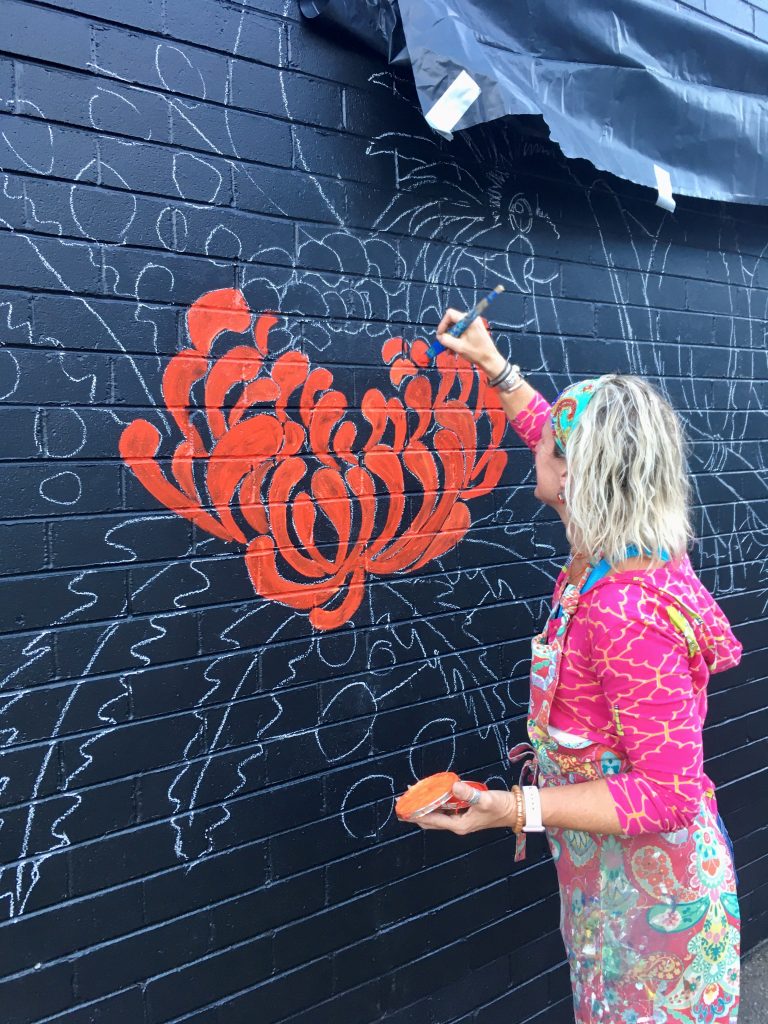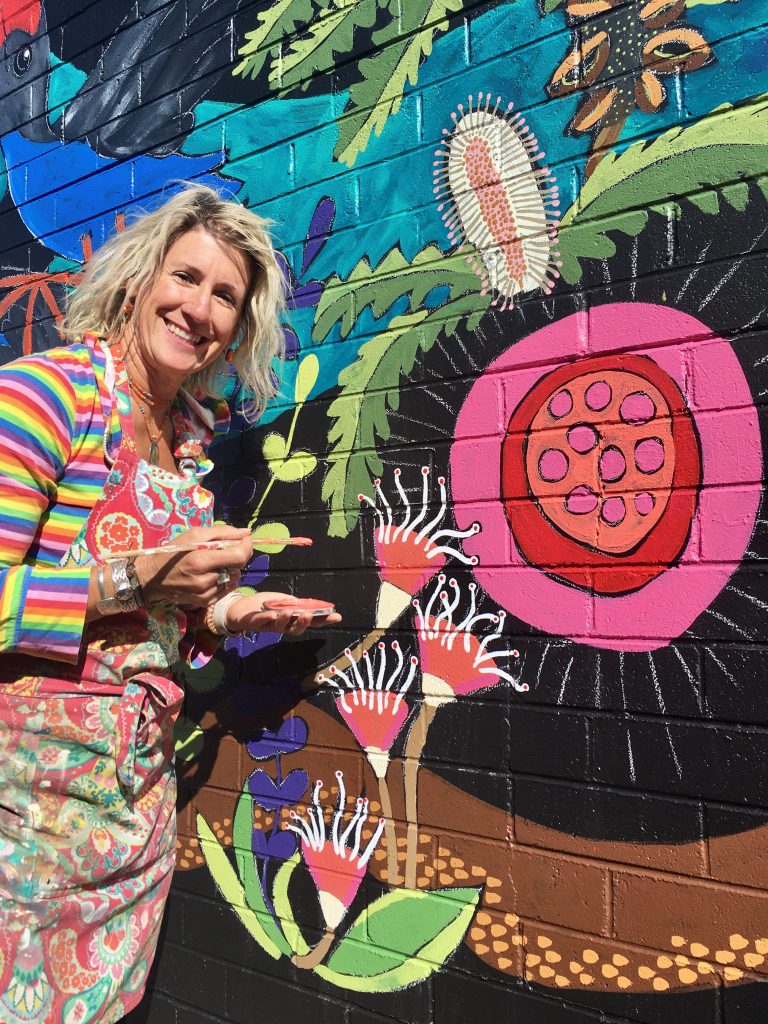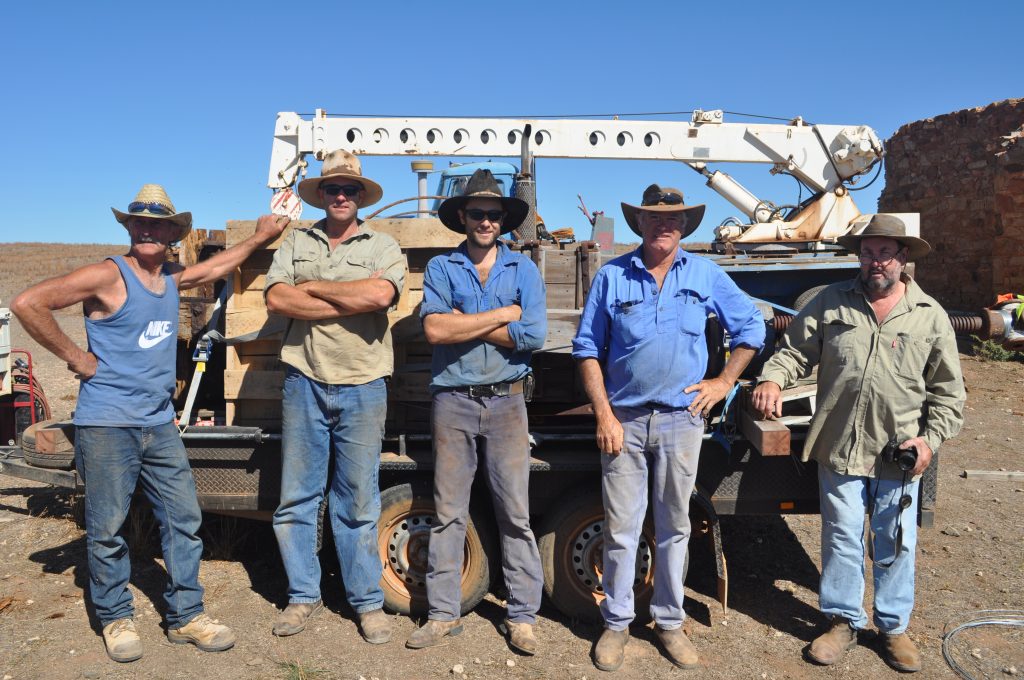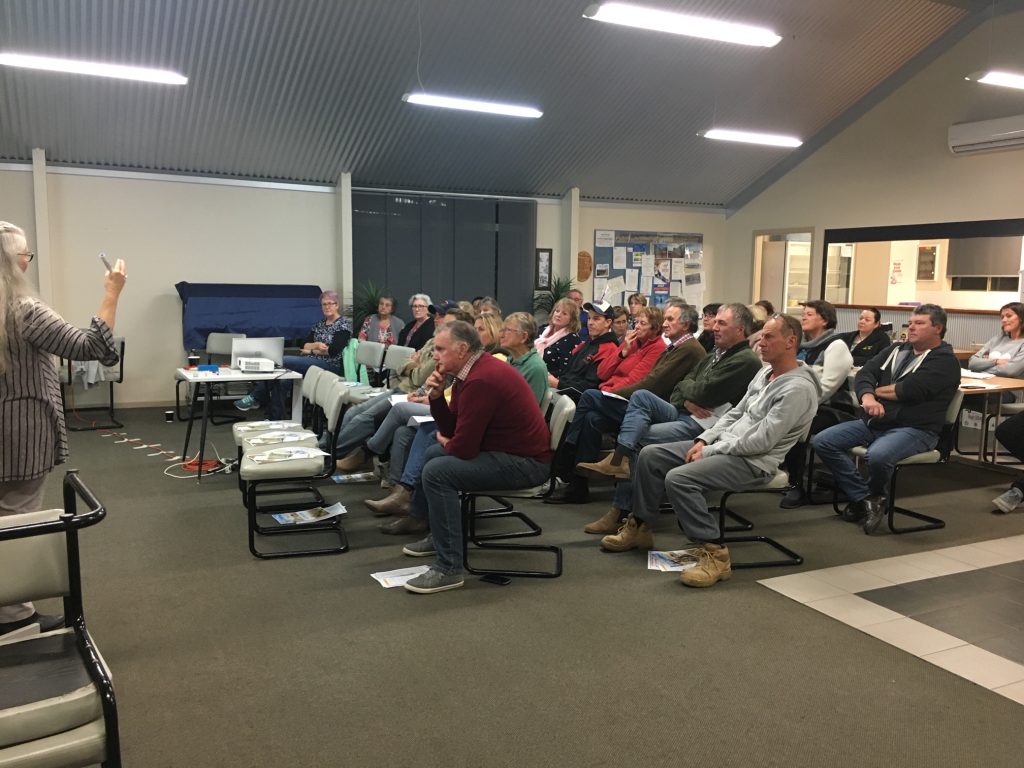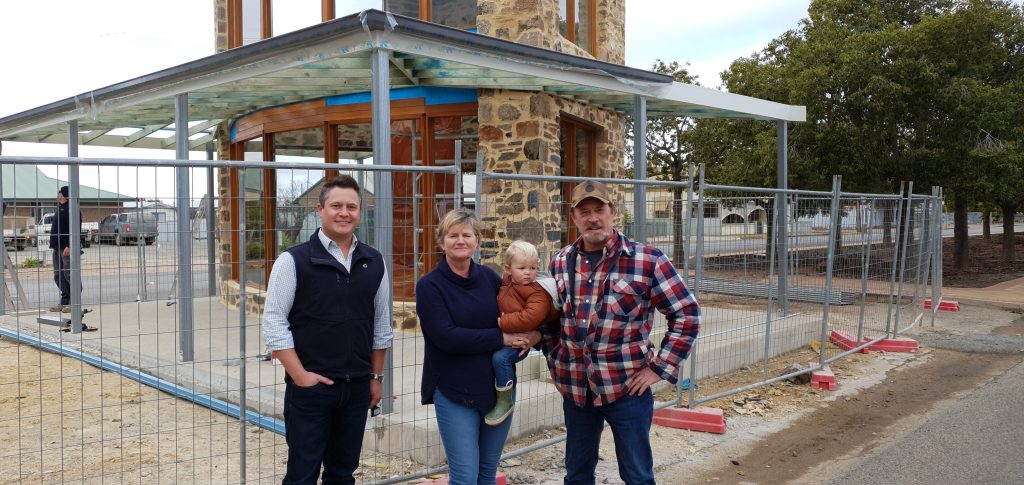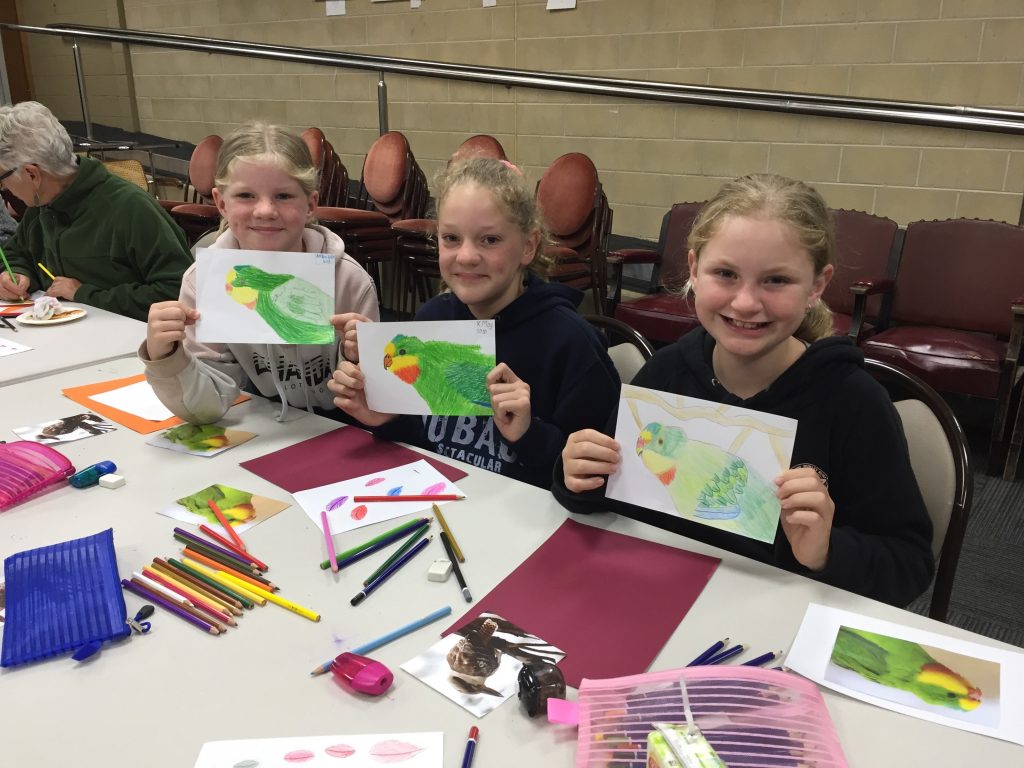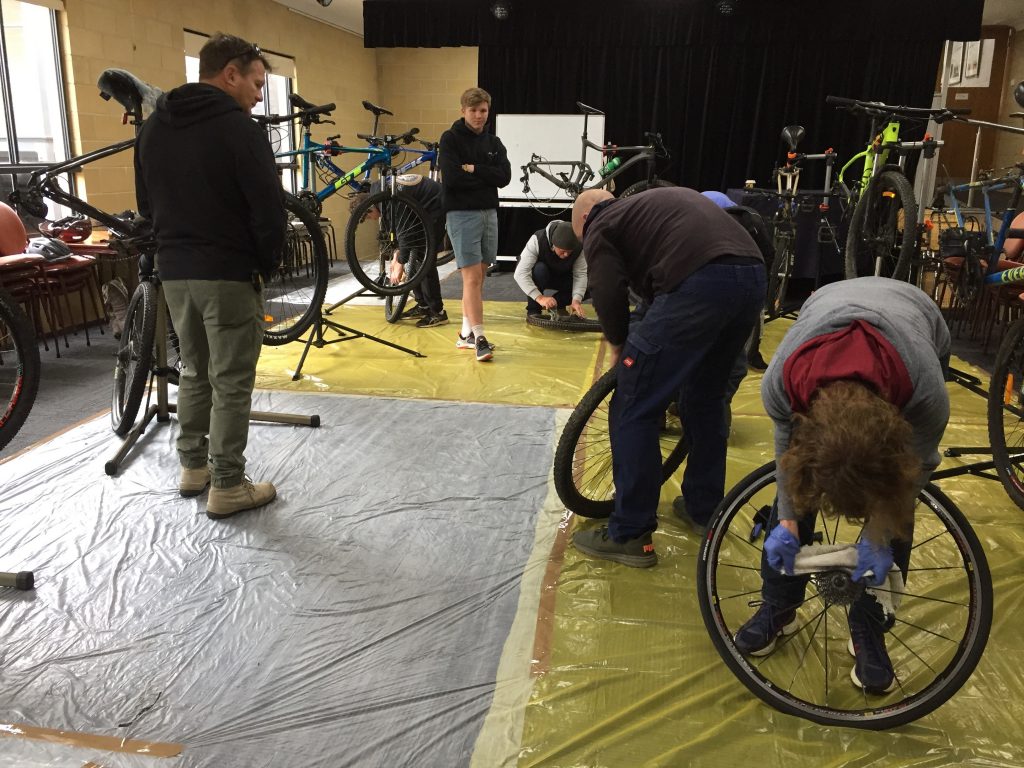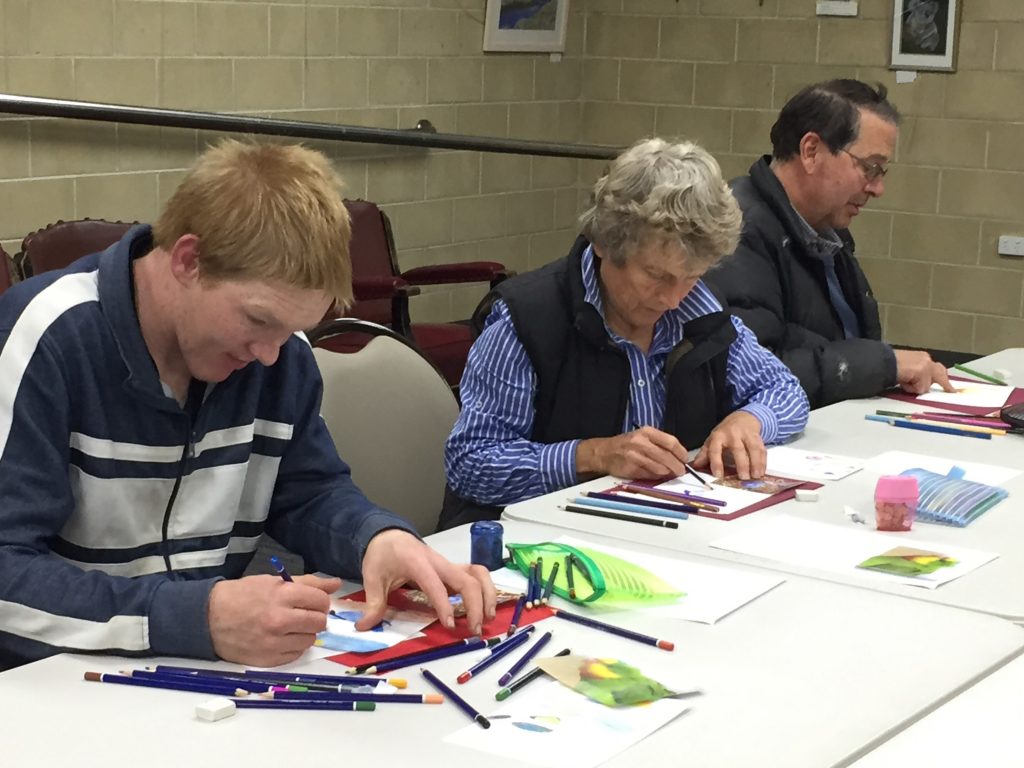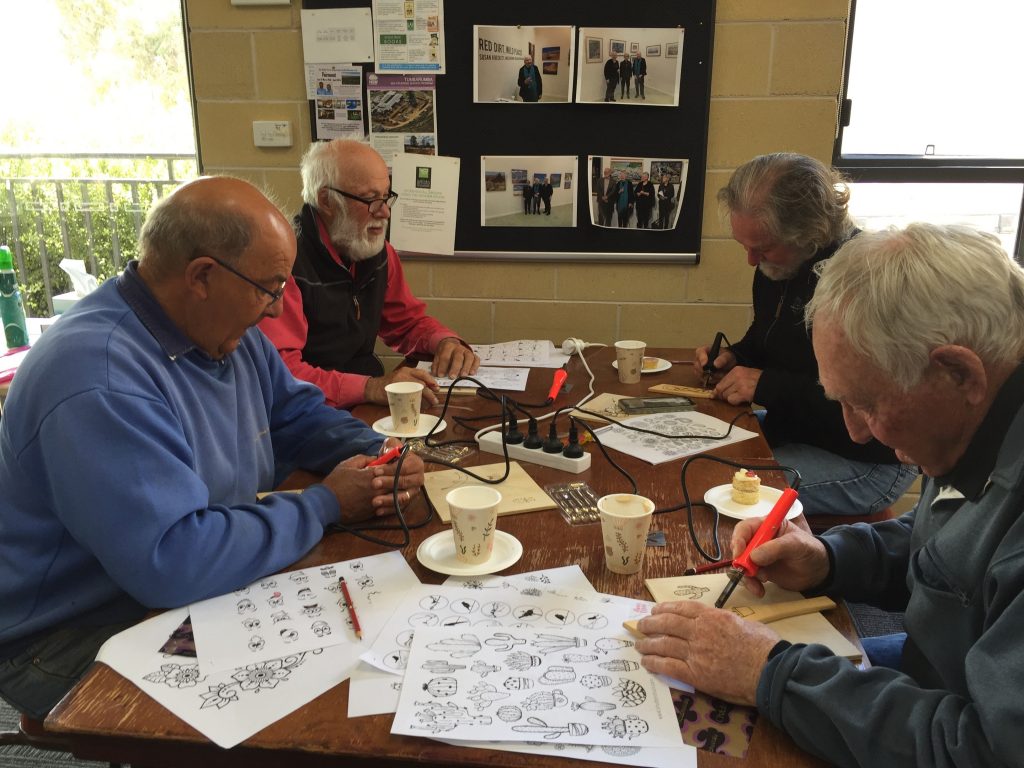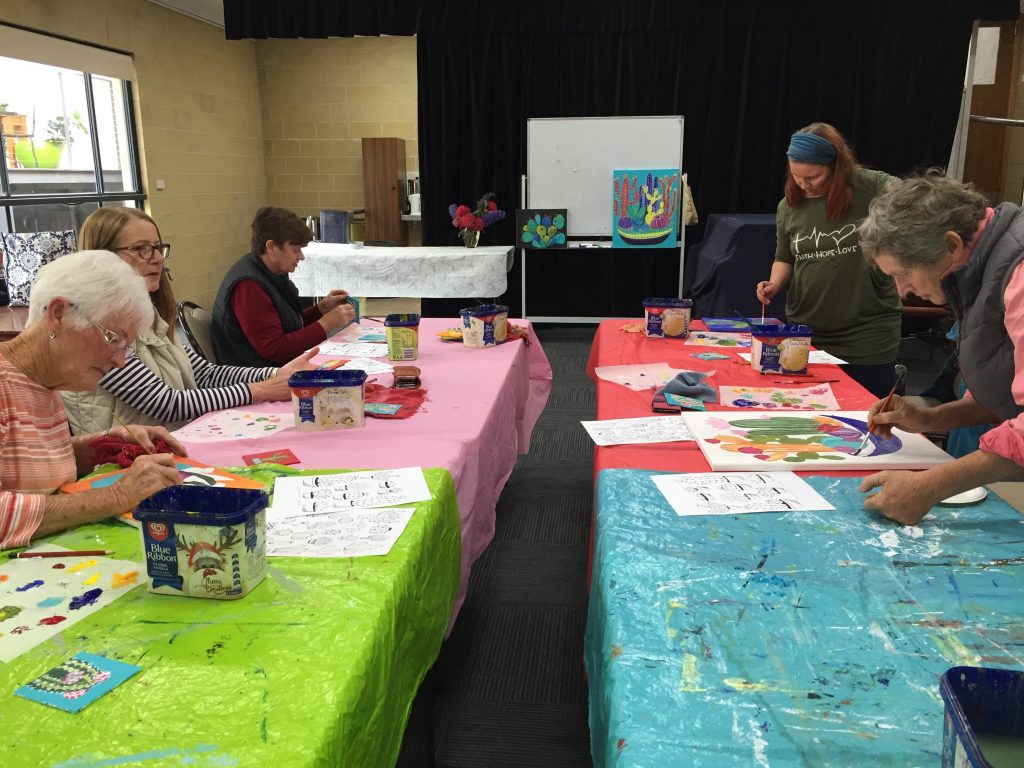Foundation for Rural & Regional Renewal (FRRR)
Three regional communities to take part in multi-year initiative
FRRR’s Disaster Resilient: Future Ready (DR:FR) Victorian program continues to build steam, with three regional communities selected to partner with the Foundation to strengthen the resilience and preparedness of their regions.
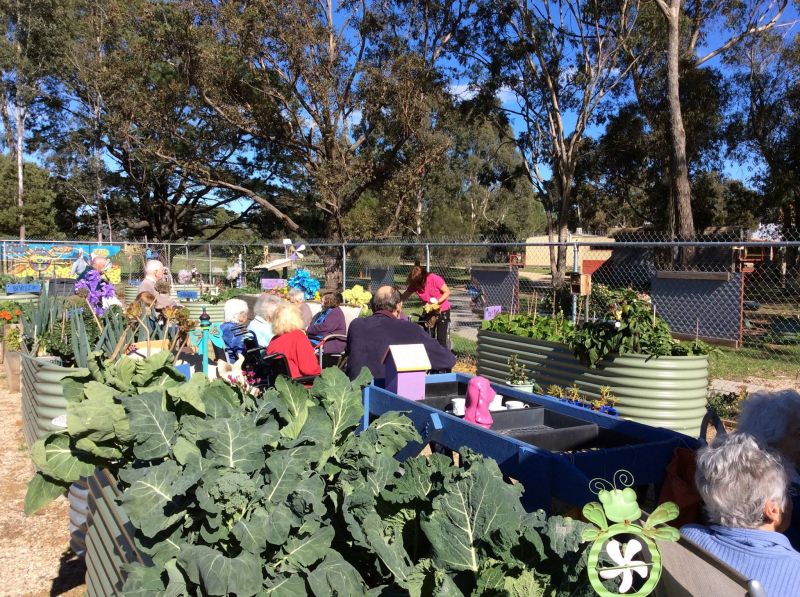
Korumburra, Myrtleford and Whittlesea township and surrounds will receive support as part of a multi-year, community-led program that is supported by a number of philanthropic organisations.
Nina O’Brien, FRRR’s Disaster Resilience and Recovery Lead, said that the DR:FR initiative works to better prepare communities to address the impacts of climate change, natural disasters and broader disruptions that affect the sustainability, vitality and resilience of remote, rural and regional communities across Australia.
“This is a place-based initiative, whereby FRRR works at a hyper-local level with grassroots organisations and community representatives who are interested in collaborating and leading initiatives to increase community preparedness and strengthen resilience capacity.
“The model is designed to help communities identify and then enact solutions that are held in local knowledge and the intersections of people and place. It creates space, facilitates processes, builds relationships and provides resources for community-generated resilience conversations and initiatives to be held at a pace and style that is appropriate for each local community,” Ms O’Brien explained.
Community driven
Late last year community representatives were invited to submit an Expression of Interest (EOI) to become partner communities. Over the past eight months, FRRR’s DR:FR Program coordinator has engaged with representatives from the shortlisted communities, listening and learning about what is unique and important to each place and exploring their readiness, willingness, and capacity to participate in this intensive process.
This process helped FRRR understand their shared aspirations, what they believe is important about their community and demonstrated the commitment and interest in participating in the program.
“The emphasis is on the communities being actively engaged and involved in the process. Our aim is to empower local people to build and adapt the strengths, tools and resources that already exist in each community to further strengthen the resilience and preparedness of each place. It will be community-led and tailored to each community, with support and resources provided to allow them to identify, create and sustain their own resilience-building approaches,” Ms O’Brien said.
The program will start in the next month, beginning with a series of activities to bring interested community members together and start engaging with the broader community around aspirations for the future. In addition to the facilitation support from FRRR, the communities will have access to funding for community activities that support community engagement activities and a seed funding pool to engage a local community connector and activate priority actions identified through the DR:FR journey.
More communities waiting in the wings
“While three communities have been selected, there is strong interest from other places to participate in this program,” Ms O’Brien said.
“We have several communities keen and ready to jump on board and we would love to work with them. Our hope is to expand this program to at least one other Victorian community, and we also have groups in other states wanting to be involved.
“But this requires further funding, so we and our partners can work alongside and support local leaders to create meaningful and lasting change that means they can endure, adapt and evolve from disruptions and disasters more quickly, positively and strongly.
“We are grateful to our current partners for making the Victorian DR:FR program possible. We’d love to hear from others with the capacity to partner with us to expand the program,” Ms O’Brien said.
The DR:FR initiative is kindly supported by the following partners: Sidney Myer Fund, Lord Mayor’s Charitable Foundation, Maple-Brown Family Foundation, Simon Kucher and Partners, Ronald Geoffrey Arnott Foundation, H & L Hecht Trust, Suncorp, Pinnacle Charitable Foundation and the Doc Ross Family Foundation.
For more information about the program, visit https://frrr.org.au/drfr-victoria/.
Significant funding to rebuild and recover from COVID
The Foundation for Rural & Regional Renewal (FRRR) has welcomed a significant boost to its flagship Strengthening Rural Communities (SRC) grant program, following an investment of more than $5 million from the Australian Government.
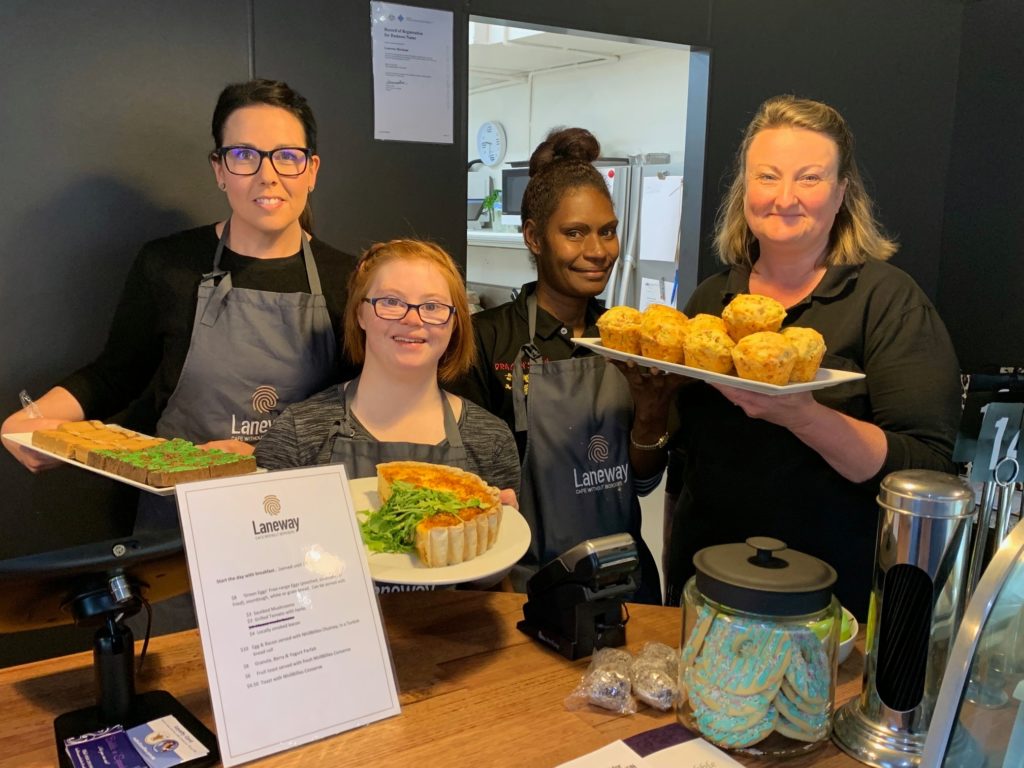
This funding, which will be available over the next two years, recognises the significant and long-lasting impacts of COVID and the localised effort needed to recover and rebuild vibrant remote, rural and regional communities.
From today, community groups and not-for-profit organisations in remote, rural and regional communities can apply for funding to support the recovery process, reduce social isolation, foster stronger, more resilient communities, or sustain these vital local organisations in their work.
The Australian Government’s support means that there will be $800,000 available in this round of SRC grants specifically for COVID-related projects. The COVID stream will have two tiers of funding – one will offer grants of up to $10,000 to groups working in communities of fewer than 50,000 people, while a second tier will offer grants of up to $50,000 for groups in remote, rural or regional communities (as defined by Australian Bureau of Statistics’ Australian Geography Standards).
Natalie Egleton, CEO of FRRR, said that the Australian Government’s investment is sorely needed and will be greatly appreciated by local organisations that have been struggling with raising funds, and coping with the effects of volunteer fatigue.
“At the end of last year, FRRR commissioned the Heartbeat of Rural Australia study, which confirmed that the pandemic has weakened the ability of community organisations to play their various roles in the community, at a time when, for many, demand for their services has increased.
“Many community groups that took part in the study – especially grassroots organisations with revenue of less than $50,000 – saw significant reductions in income as a result of not being able to run fundraising events and income-generating activities and, in some instances, funders redirecting their support. It’s also impacted the number of people able to volunteer, meaning that those remaining have been called on to do more, for longer. It’s no wonder people are exhausted.
“This program will help to rebuild rural communities by funding projects that respond to the ongoing impacts of COVID and will help communities get back on their feet.
“We’ve deliberately kept the SRC program flexible, as we know needs will be different from place to place, and from group to group. Projects eligible for funding could include supporting, training or attracting volunteers; running events; enhancing community facilities; developing services that assist people experiencing disadvantage; or purchasing equipment or resources that strengthen local organisations. We are very grateful for the Australian Government’s support and the commitment that they are showing to strengthen and rebuild rural communities,” Ms Egleton said.
In addition to the COVID funding stream, the SRC program still has grants available to support communities affected by the 2019/20 Black Summer bushfires. There is $650,000 available this round, through grants of up to $25,000. A third, more general stream of funding offers Small & Vital grants of up to $10,000 for initiatives that strengthen and support communities of 15,000 or fewer in remote, rural or regional areas.
To learn more about the program, and to apply, visit https://frrr.org.au/SRC. Applications close 31 May 2022 at 5pm AEDT.
FRRR has awarded five grants totalling $150,152 to a range of community groups in Taree and Wingham. These grants will enable local groups to invest in resources and build their capacity to support their communities’ ongoing recovery following the 2019/20 Black Summer bushfires and floods earlier this year.
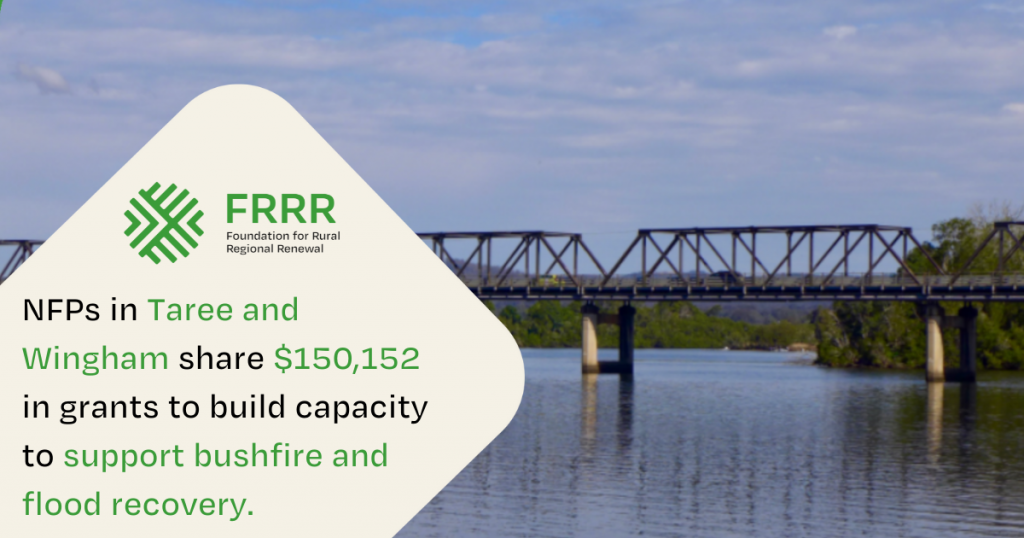
Funded through the Investing in Not-for-Profit Capacity in Regional NSW (INFPC) program, which is generously supported by the Paul Ramsay Foundation and a Taree-specific donor, these grants are part of an 18-month program. The program kicked off with a community workshop in October, where FRRR and local groups discussed local issues and how they could be resolved with community-led solutions.
This round of applications saw requests to support many of the issues raised during that session, including strategic and operational planning, marketing, revenue strategy and a digital solution to support volunteers and NFP organisations.
Joanna Kemp, FRRR’s INFPC Program Manager, said that there were many common themes among participants and community groups.
“Uncertainty and volunteer fatigue are real concerns for NFPs in Taree and Wingham, and in fact it’s something that FRRR is consistently hearing from rural organisations across the country. The cumulative impacts of disasters like fires, floods, the mouse plague and COVID-19 mean that community groups simply don’t have the volunteers, resources and training that they need in order to tackle the issues in front of them.
“The applications for this funding also align with what we heard in our recent Heartbeat of Rural Australia study – volunteer fatigue, excessive red tape in many grant application processes and a lack of resources are making it challenging for rural community groups. These are all issues that also came up during our community workshops, which is why we are delighted to be able to offer programs like INFPC that help address some of these issues.
“From engaging with these organisations, it’s apparent they have an unwavering commitment to bringing positive change to their communities’ and to becoming more prepared in the days ahead. The grants will allow these not-for-profit organisations to scale their operations and continue to provide essential services to their community as they recover from successive disasters,” said Ms Kemp.
The five grant recipients are:
- Circartus Incorporated, Wingham – Making the Most of What We Have – Boost the capacity and future sustainability of local circus school, Circartus Inc, through the development of a strategic plan and webpage design. $10,152
- First Steps Count Incorporated – Genuine Co-design with Community, Taree – Engage community in the development of the operational plan for a new community hub servicing children and families in Taree by resourcing a Co-Design Coordinator role. $25,000
- Mid Coast Outreach Incorporated, Wingham – Mid Coast Outreach – Office and Marketing Support – Grow the capacity and profile of newly established organisation, Mid Coast Outreach, through support for human resources, branding & marketing, and IT infrastructure. $34,000
- Mission Australia, Taree – Mid Coast 4 Kids Revenue Strategy – Boost the operational capacity of ‘Mid Coast 4 Kids’, collective impact project seeking positive social outcomes for children, young people and families, through the development of a revenue strategy. $6,500
- Wingham Chamber of Commerce, Wingham – Not-for-Profit Portal – Build the capacity of not-for-profit organisations in Taree and Wingham through consultation and development of shared digital tools to improve volunteer efficiency and effectiveness, and overall organisational capacity. $74,500
For more information about the Investing in Not-for-Profit Capacity in Regional NSW program, visit – https://frrr.org.au/investing-in-not-for-profit-capacity-nsw/.
Having worked at a community level for 5 years now, most recently as a Program Coordinator and Community Development Officer for Blackall Tambo Regional Council, Jaimee-Lee Prow has experienced first-hand the generosity and good intentions that relief agencies have when it comes to drought in remote, rural, and regional communities. However, these good intentions often don’t translate into practical and accessible support at a grassroots level. Here she shares her story.
To paint a picture of what I mean, I’ll explain a bit about what our experience has been with relief agencies within the central western Queensland drought space. Off the top of my head, I can name at least 20 organisations that offer much the same kind of assistance. This overlapping service provision is driving a state of competitiveness among these organisations and, from a community perspective, has led to a matrix of issues that prevent community groups from taking them up on their offers of assistance. This, on top of a disconnect at a community level, has meant that these relief organisations are actually hindering themselves from reaching the goals that they set out to achieve.
We rural people are a stoic breed. This over-supply of relief support has led to a lot of miscommunication, confusion, and apprehension, resulting in people abstaining from seeking assistance. Or else people become overwhelmingly confused about how to navigate the many systems with most deeming it as an added stress that they simply don’t need. Another familiar scenario is that of individuals, community groups and local-not-for-profits who don’t apply for assistance through one organisation because they’ve already applied for similar assistance through another organisation, and they fear that it will be seen as ‘double dipping’.
Beyond the confusion and burdensome processes, rural communities often feel that these relief agencies fail to properly consider the demographic that they’re dealing with. A large portion of our graziers, primary producers, small business owners and community members are over the age of 65 years with many of them either being extremely hesitant about social media or else completely oblivious to it. Yet, many of these relief organisations use social media as their main tool for promotion and one of their primary platforms for getting information out there. It’s also common that applications for grants will exist predominantly online and even requests for assistance are virtual. As a result, a large portion of our drought impacted population are missing out on the valuable financial assistance offered by the relief agencies. So, a word of advice – this generation still rely on good old-fashioned word of mouth, and mainly prefer to trust “the local bloke”.
Charities, not for profits and non-government organisations can take action to shift from their traditional roles as relief agencies and move towards becoming partners who walk in lockstep with resilient and prepared communities. These relief agencies are, of course, well-meaning but most, if not all of them, are based outside of our region. Some of them even have a strictly virtual presence. Which is why, despite the obvious devastation of drought that surrounds us, they often walk away scratching their heads at the low levels of relief uptake after briefly popping up in our communities. The lack of local coordination and sharing of information on the ground is, ultimately, failing our rural communities.
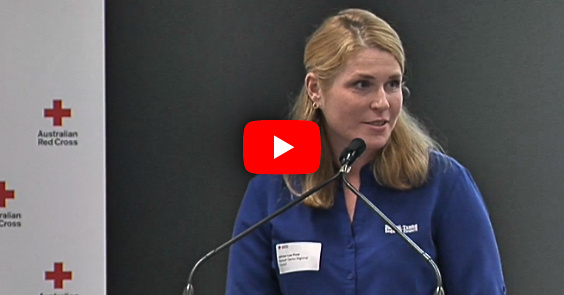
So, how do we fix the problem?
The solutions aren’t necessarily innovative or complex. In fact, they’re quite simple. Below is a list of steps that relief agencies can take to provide effective support to our drought effected communities:
Step one: listen to the locals
As mentioned in the Red Cross Drought Resilience discussion paper, projects and program delivery from organisations need to be locally focused to meet the needs of the region they are working with. When it comes to providing assistance for our communities, blanket approaches simply don’t work and a ‘one-size-fits-all’ solution doesn’t exist.
Step two: we need more than just a plan for the future
We are really at a critical point within the community drought recovery process where we need to keep the momentum going and continue to create or maintain partnerships. Within my local community. I have recognised a shift away from the initial panic and knee jerk reactions to the disaster. Local individuals, groups, businesses, and farms are now ready to accept and explore actions they can take to prepare for future drought- something that wasn’t possible in the initial stages of drought response.
Our initial response was to flood funds upon our drought impacted communities. And this was evident in the amount of overlapping we saw in service provision from our relief agencies. Don’t get me wrong, to a degree we certainly needed it. But what we are starting to see or recognise now is that drought funding is starting to dry up, and services are beginning to wind back in our rural communities. This imbalance between community readiness and resources, and the funding now available is a major concern moving forward. In the disaster recovery and planning phase, we need the resources now more than ever to be ready for next time.
Step three: simple applications and greater flexibility
We need to ensure application processes are simplified and easy to access. This will benefit all sections of the community but is crucial if organisations want their programs to be accessible to applicants aged 65+. Secondly, because each region is different, the criteria grants need to be made more flexible so that projects can be locally defined by the communities themselves and can be used to support a cross section of activities such as infrastructure, events, training, capacity building and network development.
Step four: recognition of the role that local organisations play
Local organisations are the backbone of remote, rural, and regional communities. Therefore, programs need to be modelled around their goals and needs. In order for partnerships to be successful and meaningful to our communities, agencies must be personable within the community, and the program itself must be driven by the community that the agency is working with.
During my time working at Blackall Tambo Regional Council, I have worked closely with FRRR on a number of drought resilience initiatives. FRRR have championed solutions that have been led by our community and that are driven by the needs and abilities of those living in our region. I believe that this approach to disaster recovery is the way of the future.
Step five: events and projects should be led by trusted locals
This is the valuable way to connect, respond, recover and plan ahead. While some are of the belief that the community barbecue or the local arts and cultural workshop are a band-aid solution to relieving the impacts of drought, those from rural communities would actually beg to differ. We come from significantly isolated areas. These types of community events, particularly during drought, are a necessity for creating touchpoints, social check ins, networking opportunities, and they keep our communities connected.
Some of the most brilliant ideas for future proofing and planning are sprouted through general chitchat amongst like-minded people at these types of events. We are already seeing some relief organisations which have come into our region, begin to recognise these events and spaces as the perfect platform for informal networking and building a rapport with our community members. As a result, partnerships have become stronger, and we find that these organisations who take these extra steps have a better understanding of our community’s needs which results in a greater uptake of their services.
Step six: continued government and philanthropic support
As I’ve already mentioned, it’s crucial that relief agencies don’t simply pull the plug and let funding dry up. Our rural communities are now more than ready than ever to prepare and build resilient regions through planning and projects. We just need the continued commitment to fund and provide resources.
Step seven: build local champions
As an NFP, charity and non-government organisation you should be an active collaborator, but you should essentially be led by locals. Start building your local champions in the communities you were working with. They will be your best investment.
Finally, I’ll finish with something I heard once that I believe perfectly sums up the attitude we must approach the future with if we’re going to continue to build prepared and resilient communities: “You don’t need to be strong to survive a bad situation. You just need a plan.”
Much needed boost for 17 initiatives in affected NSW and QLD rural communities
FRRR, in partnership with Suncorp Group, has awarded $200,000 in grants to 17 community groups and local not-for-profits in rural areas impacted by the March 2021 floods and storms for initiatives that will support their recovery from the disaster.
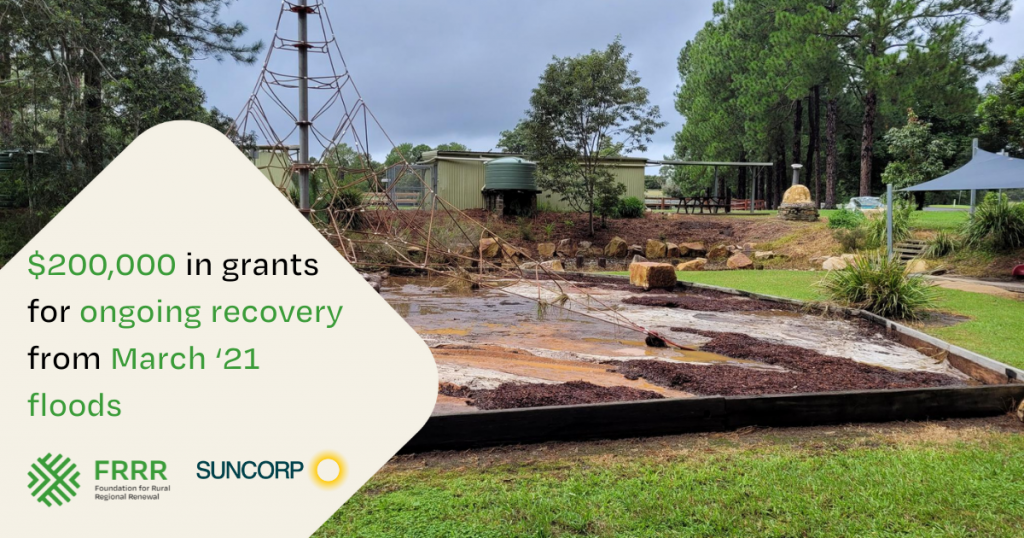
Funded through the Rebuilding Futures program, grants awarded range from $1,573 to $15,000. This funding will help with projects such as restoring damaged infrastructure, improving buildings and maintaining equipment needed for future disaster events, developing local disaster-response knowledge and skills, and providing access to services that foster recovery.
These grants are the first to come from Suncorp Group’s $1 million pledge to FRRR to support rural Australian communities impacted by, or vulnerable to, significant natural disasters.
Natalie Egleton, CEO of FRRR, said the grant recipients have showed a sense of resolve and strength when it comes to rebuilding.
“Recovery is not a quick process – not every community is going to have the capacity to take the same steps at the same time. Despite this, and the challenges of COVID-19 and volunteer fatigue, we’ve been genuinely impressed by the drive of local groups to actively seek support and funding to help their communities recover from the floods. It’s this kind of resilient spirit and motivation that will see these communities thrive once again.
“More than 50 percent of the applications we received for this round were for infrastructure and equipment, which shows not only the extent of the physical damage from the flooding, but also the long-term approach that these organisations are taking to the rebuilding of their communities,” said Ms Egleton.
Suncorp Group CEO, Steve Johnston, said these grants will enable recipients to overcome challenges and take control of their futures.
“The recipients of these grants are determined to make sure their communities recover and bounce back from the March 2021 floods. Natural disasters can turn people’s lives upside down, but the challenge has become even greater with the added pressure of the pandemic.
“Our remote, rural and regional communities know how to come together and work to rebuild their own futures. That’s why grant programs like these, that champion community-led recovery, are so crucial,” said Mr Johnston.
Among the 17 projects funded this round are:
- Bumbalong Valley Progress Association, NSW – Bumbalong Emu Project – $12,490 – Boost community connection and support the conservation of the local emu population by replacing infrastructure damaged during the March 2021 floods.
- Hawkesbury City Council, NSW – Hawkesbury Community Tech Connect – $14,836 – Enhance access to internet and mobile phone coverage with the creation of community technology hubs across the Hawkesbury region reducing isolation and supporting disaster recovery activities.
- Weemelah Hall, NSW – Beautification and Infrastructure Upgrade Project – $13,358 – Enhance community spaces with the installation of a BBQ for community use and beautification of the Weemelah Hall.
- Rathdowney and District Memorial Grounds Association Incorporated, QLD – Repair Rain-damaged Equestrian Arena and Make it Flood-resistant – $15,000 – Upgrade community infrastructure to mitigate the impacts of future flood events on the Rathdowney Memorial Ground.
More information on the Suncorp Rebuilding Futures grant program is available here.
The full list of grant recipients and their projects are below.
| Organisation | Project | Location | Grant | |||
|---|---|---|---|---|---|---|
| NEW SOUTH WALES | ||||||
| Bermagui Area Chamber of Commerce & Tourism Inc | A Positive Future Grow the organisations capacity to support the community with the provision of a portable projector and screen to enhance the delivery of community activities and events. | Bermagui | $2,584 | |||
| Bumbalong Valley Progress Association | Bumbalong Emu Project Boost community connection and support the conservation of the local emu population by replacing infrastructure damaged during the March 2021 floods. | Bumbalong | $12,490 | |||
| Hawkesbury City Council | Hawkesbury Community Tech Connect Enhance access to internet and mobile phone coverage with the creation of community technology hubs across the Hawkesbury region reducing isolation and supporting disaster recovery activities. | Bilpin, Colo & St Albans | $14,836 | |||
| Huskisson Public School Parents and Citizens Association | Huskisson Public School Community Canteen Boost community resilience and connection with upgrades at the Huskisson School canteen, providing appropriate cooking facilities for the community to cook, prepare and share meals. | Huskisson | $10,000 | |||
| Kempsey Singers Incorporated | Kempsey's Bandbox Theatre Costume Conservation Project Boost organisational capacity by repairing and mitigating future flood impacts at the Bandbox theatre and replace a portion of costumes damaged by the March 2021 floods. | Kempsey | $5,000 | |||
| Kendall Men's Shed | Noise Level Reduction Boost the service offerings at the Kendall Men's Shed with noise reducing machinery encouraging community participation and connection. | Kendall | $1,573 | |||
| Make a Difference PMQ Incorporated | MAD SHED Boost the organisations capacity to support their community, particularly through recovery with the provision of a shed to house essential equipment and machinery. | Port Macquarie | $15,000 | |||
| Mission Australia | The Common Approach - A Whole of Community Response to Child and Youth Wellbeing Grow community connection and wellbeing by providing activities through "The Common Approach" as a whole of community response to child and youth wellbeing across the Mid Coast region. | Taree | $10,811 | |||
| Unkya Reserve Committee of Management Nambucca Valley Council | Stay and Play - Unkya Reserve Playground Flood-Resilient Upgrade Boost access to family oriented community spaces with the repair of stairs and the installation of picnic table, bench and shade at the Unkya Reserve. | Eungai Creek | $15,000 | |||
| Quambone Resources Committee Inc | Quambone Memorial Hall - Final Touches Boost community connection by providing enhancements to the Quambone Memorial Hall, ensuring access to a comfortably appointed community facility for all to enjoy. | Quambone | $12,500 | |||
| River Cares Incorporated | To Improve Emergency Preparedness and Resilience by Developing a Community Emergency Plan Support emergency preparedness for Spencer and surrounding areas with the development of the Spencer Community Emergency Response Plan. | Spencer | $14,832 | |||
| UCA - Lifeline North Coast (NSW) | Psychological First Aid Workers - First Response Volunteers Strengthen community members mental health and wellbeing and assist in the training of community volunteer in Mental Health First Aid to support local recovery and resilience building. | Coffs Harbour | $14,800 | |||
| Upper Macleay Pre-School Incorporated | Tranquil and Safe - Upper Macleay Preschool Flood Recovery Initiative Support flooding preparedness by enhancing the Upper Macleay Preschool with repairs to flood damaged infrastructure and better preparing for future flooding events. | Willawarrin | $12,487 | |||
| Weemelah Hall | Beautification and Infrastructure Upgrade Project Enhance community spaces with the installation of a BBQ for community use and beautification of the Weemalah Hall. | Weemelah | $13,358 | |||
| Young Men's Christian Association of Sydney | The Y NSW CoastTeen Project - Empowering Peer-to-Peer Mental Health Support for Young People Living on the Central Coast Support community wellbeing with the delivery on the Youth Mental Health Peer Support program in the NSW Central Coast region. | Lake Haven | $14,729 | |||
| QUEENSLAND | ||||||
| Rathdowney and District Memorial Grounds Association Incorporated | Repair Rain-Damaged Equestrian Arena and Make it Flood Resistant Support the mitigation of impacts of future flood events on the Rathdowney Memorial Grounds by repairing, leveling and compacting the sand arena damaged during the March 2021 floods. | Rathdowney | $15,000 | |||
| Tamborine Mountain A H & I Society Inc | Replacement of Safety Rails on Access Ramp Increase accessibility to the Tamborine Mountains Showgrounds Pavilion by replacing the handrails and the front of the pavilion. | Tamborine Mountain | $15,000 | |||
Capacity building grants support long-term recovery initiatives of local not-for-profits and community organisations
FRRR has awarded grants to four Victorian community groups playing a central role in the long-term recovery of communities impacted by the 2019/20 bushfires.
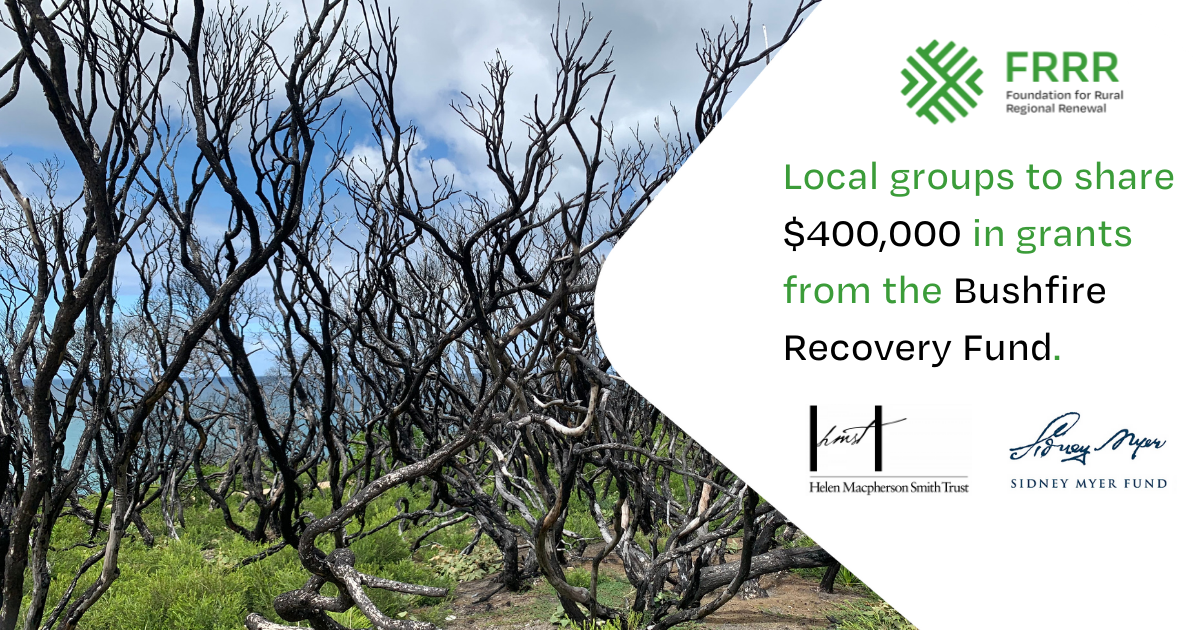
The grants are the first to be awarded through the Bushfire Recovery Fund established thanks to a multi-year partnership with the Helen Macpherson Smith Trust (HMSTrust) and the Sidney Myer Fund. The program is designed to strengthen the capacity of local not-for-profit organisations and community groups operating in fire-affected areas to support the ongoing recovery of communities.
Natalie Egleton, CEO of FRRR, said that having access to longer-term, multi-year support is vital when it comes to creating effective solutions on the ground to allow these communities to recover and thrive.
“These grants recognise the vital role of these organisations and invest in the skills, tools and resources they need to support their community as they rebuild, and to sustain their work beyond the recovery. With the additional pressure of COVID-19, this multi-year support will mean they can confidently plan, invest and be there to support their community as needs change,” Ms Egleton said.
HMSTrust CEO, Debra Morgan, said that the Trust believes local organisations are best placed to understand local needs, and that this is particularly the case in bushfire-affected areas, where it’s critical that organisations have the support they need to sustain their operations.
“The four organisations have identified the needs specific to their communities, and each has a unique approach to the road to recovery. The projects reflect the local context of each community and the interventions required for long-term recovery. We are pleased to support these strong organisations seeking to build organisational capacity and resilience, and we hope they will serve to strengthen the communities into the future,” Ms Morgan said.
Sidney Myer Fund CEO, Leonard Vary, said that the Bushfire Recovery Fund aims to strengthen the operations of ‘backbone’ organisations and give each the means to implement effective and innovative approaches in supporting impacted communities over the longer term.
“Local organisations must be given the tools to develop and implement plans for sustainability and growth so as to support bushfire-affected communities into the future. These grants will help enhance organisational capability and improve the services offered to communities including future preparedness efforts,” said Mr Vary.
The four groups funded are:
- Alpine Valley Community Leadership (AVCL) – $90,000 – Build AVCL’s capacity to strategically plan and deliver leadership training that can more effectively support and build community recovery capacity in north-east Victoria.
- Corryong Neighbourhood House Inc – $103,340 – Increase operational capacity by providing an additional .8 FTE to the core staffing levels. The increased resource will enable Corryong Neighbourhood House Inc to continue to progress its strategic social enterprise and community development work including participation in bushfire recovery work.
- Mallacoota Community Health Infrastructure and Resilience Fund Inc (CHIRF) – $113,230 – Enable the employment of a skilled local project manager, who will progress the current aims for developing the local mental health services offering through strategic planning, fundraising and project design and development.
- Mount Beauty Neighbourhood Centre (MBNC) – $100,000 – Increase operational capacity of the organisation, which will allow it to develop a prepared and resilient community. The driving force behind this application is the volunteer-run Keep Calm Committee, which works alongside MBNC.
More information about the Bushfire Recovery Fund is on this website.
Yuin Nation
Professional artists from the Bega Valley are invigorating Pambula Village with vibrant and colourful large-scale artworks, thanks to a bushfire recovery initiative.
Six commissioned pieces now complement a 22-site historic walking tour and are providing a boost to morale, employment and tourism.
The Bega Valley LGA was among the most impacted by the 2019/20 Black Summer bushfires, with 465 houses destroyed, 1,279 rural landholders impacted and around 60 per cent of the area burnt. Pambula has also experienced drought and COVID-19. The cumulative effects of all this have resulted in the loss of livelihoods, employment, prospects, wealth, environment, sense of security and mental wellbeing.
The Waislitz Family Foundation, in partnership with Australian Community Media, joined forces with FRRR after the Black Summer bushfires to support recovery. The Pambula arts project was granted $25,000 through FRRR’s Strengthening Rural Communities program, funded by the Waislitz Family Foundation in partnership with Australian Community Media.
Pambula Business Council President Michelle Pettigrove said the road back from the region’s losses is long and daunting and the ongoing Pambula Art Project gives this community a strong sense of unity, pride and direction.
“There is a discernible buzz on the street, tourists talk about the great community spirit of the town,” she said.
Artists get to exhibit their work to a large audience while helping increase Pambula’s profile and attract visitors to the Village and extended Bega Valley region. It’s boosting sales for local businesses and creating a more culturally vibrant community.
The Art Project was also mentioned frequently by voters when Pambula was named a finalist in the NSW Small Top Tourist Town awards.
While many buildings in Pambula have some historic significance, plain brick walls of newer buildings were identified as perfect ‘canvases’. Some artworks were painted directly onto buildings, and a clever solution using Laminex and aluminium panels meant others could be installed to building facades without causing damage.
Ms Pettigrove said the artworks were not designed to overpower the existing streetscape “but rather to illuminate and amplify Pambula’s historic, cultural and environmental identity, including the history and connection to country of the Yuin People – the original custodians of our region”.
A self-guided history walking tour map has also been produced, featuring 22 of Pambula’s historic buildings and sites to shine a spotlight on the fascinating and quirky history of the village and local identities. Pambula was the birthplace of Sir William McKell, the second Australian-born Governor General, and his home is now an art gallery. Syms Covington, who served with Sir Charles Darwin on ‘The Beagle’ retired to Pambula and continued to send Darwin samples of Australian flora and fauna for many years. Covington then served as postmaster in Pambula and his house is now a popular restaurant/gallery.
Future plans for the project include adding and celebrating more Yuin Nation history in the original self-guided History Walk, following ongoing extended consultation with both the Bega Aboriginal Land Council and the Twofold Aboriginal Corporation.
FRRR has awarded $1,413,319 to 33 remote, rural and regional communities across Australia for locally-led initiatives that will help build their region’s resilience to drought.
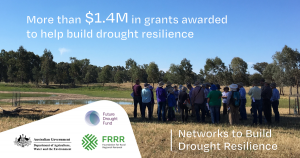
Funded by the Australian Government’s Future Drought Fund and a range of other donor partners, the Networks to Build Drought Resilience program focuses on strengthening social connectedness, building social capital and funding transformative local initiatives that will enable agricultural communities to be more prepared for the impacts of drought.
The grants, which range from $10,000 to $139,000, were awarded to local groups to support community projects such as events that will bring people together, training that will increase knowledge and skills, and infrastructure that will facilitate and enable networking.
Natalie Egleton, CEO of FRRR, said that when it comes to building drought resilience, resourcing initiatives that enhance social connectedness and networks is more crucial than ever.
“Rural communities are typically pretty self-reliant, and depend on being able to come together and work as a community to prepare for and respond to most challenges. That includes building resilience to respond to the changing climate, and this round we saw some great projects and initiatives that will strengthen resilience and respond to local needs.
“With many of these rural communities impacted by COVID-19, plus drought, fires, and for many the mouse plague, local fundraising has been even more difficult than usual. So it’s wonderful to be able to offer the support these places need to strengthen community connectedness and build their networks.
“We’re grateful to be partnering with the Australian Government, and to have the support of our other donor partners, because it allows us to back these grassroots organisations who are making significant strides when it comes to preparing their communities for future drought,” said Ms Egleton.
Some of the 33 initiatives funded include:
- Women Together Learning (WoTL Ltd) – Rudall, Cowell, Karoona, Pinnaroo, SA – Building the WoTL Ambassador Network to Support Women in Ag – $29,625 – Building the WoTL Ambassador Network to support women in agriculture through a series of workshops.
- Bundaberg Fruit & Vegetable Growers – Bundaberg, Gayndah, QLD – Connecting Producers with an Invisible Support Network – $16,200 – Build capacity among growers for training in mental health and wellbeing and to access local support services through a series of BBQ workshops.
- Gippsland Agricultural Group, Bairnsdale, VIC – Gippsland Connect and Prepare Field Days – $50,000 – Increase community connection and networking activities through the delivery of field day events and installing an accessible ablution block.
- FarmLink Research Ltd, Temora, NSW – Improving Young Farmer Mental Resilience in Times of Drought – $10,000 – Expand capacity for resilience through an interactive seminar.
- The Liebe Group Inc – Dalwallinu, Mingenew, Dandaragan, WA – Women in Ag Networking and Diversification (WAND) Program: Strengthening Social Connection and Farm Business Resilience in the Regional Agricultural Community – $13,100 – Foster increased business acumen in drought resilience through the delivery of workshops.
MEANWHILE, Applications are currently open for Round 2 of the Future Drought Fund’s Networks to Build Drought Resilience program. To be considered, they must be received by 15 November, with funds announced late February. Projects must be completed by 29 August 2022. Learn more at www.frrr.org.au/FDF
The full list of grant recipients and their projects are below.
| Organisation | Project | Location | Grant | |||
|---|---|---|---|---|---|---|
| NEW SOUTH WALES | ||||||
| Funding Tier 1: $10,000- $20,000 | ||||||
| The Australian Landscape Science Institute Limited | Reading Your Landscape This project will bring local landholders together to study and discuss innovative agricultural practice solutions in two field days and a series of webinars, to manage agricultural dependent regions that are vulnerable to accelerating climate impacts. Through the workshops, participants will be encouraged to network and share ideas about Climate Resilient Landscape practices, and be supported by online webinars with a wider audience. | Bungonia | $18,270 | |||
| Monaro Farming Systems CMC Incorporated | Monaro Seasonal Outlook - Building Drought Resilience and Preparedness This project will host a Field Day in the Monaro region that includes a seasonal outlook presentation and discussion around the Farming Forecaster tool that helps farmers make informed decision to improve drought preparedness in changing climatic conditions. Facilitated discussions and reflections from past experiences will improve collaboration across the local farming network, building knowledge about drought preparedness and an understanding of the risks posed by drought and climate change, to build strategies for farmers and local communities to prepare for future droughts. | Cooma | $16,700 | |||
| Northern Rivers Community Gateway Inc - Women on The Land - Get Ready Empower Yourself | Women on The Land (WoTL) Preparedness Workshop Series This project will deliver five workshops to improve the confidence and reduce social isolation of rural and regional women, while also providing planning and coping tools for the participants to share with their broader networks. Focussing on decision making, preparedness and land management, the workshops will provide a platform to discuss mental health issues of rural and regional women, while also providing access to service providers and the opportunity to build networks for ongoing cohesion. | Casino | $14,289 | |||
| FarmLink Research Ltd | Improving Young Farmer Mental Resilience In Times of Drought This FarmLink project will host an event for Young Farmers to build the skills and networks required to manage the impacts of stress during drought, intergenerational relationships and communicating effectively within family farm businesses. The interactive workshop will bring together young farmers and experts in rural and regional resilience and mental health. Through facilitated discussions, the project will build awareness in practical on-farm strategies that improve the participants' capability to manage the stresses associated with drought and climate change in preparing for the future. | Temora | $18,096 | |||
| Murdi Paaki Regional Rugby League Council Incorporated trading as Creative Community Concepts | CCC Community Wellbeing Project This project will improve community resilience through education and mental fitness sessions in schools, and a community dinner, to build wellbeing strategies and mental resilience across local schools and the community. The workshops will build community spirit, bringing the community together to discuss strategies to prepare for difficult times and the impacts of adversity. | Gulgong | $10,000 | |||
| Funding Tier 2: $20,000- $50,000 | ||||||
| Glenrac Incorporated | Resilience, Capacity and Community Connection - Glen Innes NSW This project will support several activities to build resilience, capacity, and community connection across the Glen Innes district including monthly focus evenings, a gardening weekend and informal events that encourage participation and discussion across the community. This project will link into other programs that GLENRAC deliver on benchmarking natural capital, carbon footprint accounting and climate change resilience to build a broader skillset for the participants and the community. | Glen Innes | $49,870 | |||
| North Coast Regional Landcare Network Inc | Partnership Development Officer for NCRLN The North Coast Regional Landcare Network in NSW project will support 11 local Landcare networks, facilitating community connection and knowledge sharing across the groups, as well as increasing opportunities for these participants, and the wider regional Landcare network, to participate in networking events to build a shared understanding of the risks posed by drought and climate change in the local region, while also providing the communities with an opportunity to work collaboratively to solve problems common regional issues. | Lismore | $50,000 | |||
| Funding Tier 3: $50,000 - $150,000 | ||||||
| Western Plains Regional Development Inc | Shoring Up Community This project will give local community groups the much-needed opportunity to hold meetings and get together as they prepare for future drought. Understanding the importance of the community hall for social and professional gatherings, this project will support the upgrade of the community hall to enable it to be used year-round for community gatherings, enhancing social connectedness and wellbeing in the community. | Condobolin | $110,000 | |||
| Riverine Plains Incorporated | Enhancing Community Networks for Drought Resilience In the Riverine This project will deliver 30 workshops within the region to connect primary producers, landholders, and Indigenous custodians to build capacity and share knowledge to address the challenges of future drought and climate change conditions. The project will result in increased social connection in local networks and improved future coordination and collaboration between social networks, other community organisations and sectors in the local communities, sharing knowledge to build more resilient communities across the region. | Berrigan & Greater Shepparton | $102,300 | |||
| SOUTH AUSTRALIA | ||||||
| Funding Tier 1: $10,000- $20,000 | ||||||
| Upper North Farming Systems | Tools, Tech and Transformation – UNFS and Its HUBS 2022 This project will deliver a 'Tools, Tech and Transformation' workshop for farmers and agri-business followed by a series of nine Hub events to provide an opportunity for participants to network and share information to build their knowledge about drought resilience through learning about new farming systems and techniques to manage in a changing climate. | Orroroo | $20,000 | |||
| Funding Tier 2: $20,000- $50,000 | ||||||
| WoTL Ltd | Building the Women Together Learning (WoTL) Ambassador Network to Support Women In Ag This project will deliver five workshops focussing on future drought, climate projections and the impact on agricultural practices and rural communities, and support the Women Together Learning (WoTL) Ambassadors to come together for two days to participate in planning, professional development, and networking to enhance their skills to support the broader network. The project will bring women together that ordinarily may not link up and form an ongoing future network, addressing the needs of rural women in preparing for future drought, and support network for better preparedness. | Rudall | $29,625 | |||
| Coorong District Council | Resilient Farmer Networks Building an Understanding of Managing Soil Carbon and Livestock Methane Production, Seasonal Climate Variability, and Seeking Opportunities In Times of Drought This project will increase opportunities for a diverse group of people and communities to participate in networking through the facilitation of four workshops across the Coorong and Tatiara Districts. The workshops will build farmers' knowledge and understanding of the risks posed by drought and climate change, through the sharing of specialist knowledge in the areas of climate trends, soil carbon, and livestock methane. Through these workshops and networking events, a positive community culture will be built working together to build the community's capacity to respond to change and capitalise on opportunities. | Jabuk | $31,000 | |||
| Funding Tier 3: $50,000 - $150,000 | ||||||
| Mackillop Farm Management Group Inc | Limestone Coast Women In Ag Network This project will increase the resilience of women in the Limestone Coast region of SA to assist preparing for future drought through the delivery of four workshops for women in agriculture across the southeast region of SA. The project will also connect seven regional organisations and build linkages between these local groups to a state-wide organisation, resulting in broader reaches across the state. The network will provide lasting support and increased social connection for the group members across the Limestone Coast region. | Padthaway | $70,817 | |||
| Southern Cross University | Building Drought Resilience In Agriculture-Dependent Communities Through Mapping Young Farmer Information and Support Networks In this partnership project between Southern Cross University and Agricultural Innovation & Research Eyre Peninsula, a new 'network mapping' tool will be used to provide a detailed understanding of the Eyre Peninsula young landholders knowledge network. The project will support the agricultural dependent community of the Eyre Peninsula to build drought resilience by identifying and implementing context-specific strategies through workshops and mapping. Local champions will share key knowledge with young landholders to enhance networking opportunities around drought-resilient practices. | Wudinna | $77,163 | |||
| The Flinders Ranges Council | Quorn Quandong Festival This project’s two-day community event will bring expert speakers to present on the impacts of drought and climate change on the region to highlight the importance of forward planning and preparedness. The event will also encourage participants to be involved in the activities and network to share knowledge, while also creating an awareness of agri-food systems opportunities by showcasing opportunities and benefits offered to agricultural businesses through diversification into production of 'bush foods' and use of Indigenous species, as an alternative to traditional practices to build drought resilience. | Quorn | $139,000 | |||
| QUEENSLAND | ||||||
| Funding Tier 1: $10,000- $20,000 | ||||||
| Destination Scenic Rim Inc | Scenic Rim Round-Up The Destination Scenic Rim (DSR) project will build drought resilience and build social connection through the hosting of four events with keynote speakers across the region that will link location specific community groups, businesses, and organisations to increase collaboration and membership across the region. Held in population hubs of Beaudesert, Boonah, Tamborine Mountain, Canungra and several smaller centres, the events will bring community members together with a shared sense of purpose with an aim to increase the community's economic development and diversification. | Boonah | $12,000 | |||
| Macintyre Ag Alliance Inc | Regenerative Ag Event for Adaptable & Thriving Futures This project’s two-day event at farms across the Western Downs will provide collaborative events and opportunities to learn about new agricultural approaches to build drought resilience practices into the regional agricultural businesses and communities. Through integrating local networks with established, broader networks, the project aims to increase the social connection, networks, and capacity of landholders for best practice farm management and create drought resilient communities. | Roma | $17,188 | |||
| Red Earth Community Foundation South Burnett Limited | Red Earth Community Foundation Leadership Forum Supporting young people to respond to challenges and encourage leadership, the Red Earth Community Foundation (RECF) will host a Leadership Forum to bring together community leaders in the Burnett Inland to connect individuals, groups, and businesses. Through forum sessions, the participants will build leadership skills and form partnerships to assist the region adapt and transform to meet challenges the region will face in a changing climate. The forum will build social connectedness for the region, extend networks and create a shared sense of purpose and community belonging. | Murgon | $18,524 | |||
| Bundaberg Fruit and Vegetable Growers | Connecting Producers with an Invisible Support Network This project represents a progressive opportunity to build capability of professional, social and community networks of producers in the Bundaberg region and build long term drought resilience and social wellbeing across the network. The project will support ongoing networking opportunities, including through initial activities including two Accidental Counselling training sessions and host two informal producer BBQ's to create a network of industry representatives who are able to recognise signs of stress and access local support services for local growers to support mental health and wellbeing. | Bundaberg | $16,200 | |||
| Funding Tier 2: $20,000- $50,000 | ||||||
| GroWQ | Resourcing and Supporting GroWQ This GroWQ Project will deliver two networking events: an Ag Industry Round Table facilitating collaboration and enabling access to support in both health services and agricultural services; and a Technology showcase on innovation and business resilience in the agricultural sector and the wider community. Industry insights provided through the workshops will increase participant knowledge and understanding of the risks posed by drought and climate change, providing participants with the knowledge and tools to share with their communities to respond to a changing climate. | Longreach | $44,000 | |||
| Lockyer Valley Growers Inc | Lockyer Agriculture Resilience and Connection (LARC) Project This project will bring local growing groups together in two seminars to discuss the impacts of climate change and drought on the region, as well as publications in local magazines about local issues and identifying local practices used to manage the impacts of drought. The project will also facilitate training of committee members in governance training to support their organisation to continue to support the broader grower network. Through the involvement of around 200 producers and land managers across the region, the project will enhance networking and knowledge sharing, building a greater culture of connection across the region. | Gatton | $22,815 | |||
| Longreach Regional Council | Creating Sustainable Communities 'In the Bush' This project will facilitate four community workshops and events across issues relevant to different sectors of the Longreach community including youth issues, women's, business and work topics. Workshops through the project will facilitate local networks, increase business planning knowledge and skills, encourage social connection and ensure access to support services to build resilience and future drought preparedness in the local region. | Longreach | $32,500 | |||
| Northern Gulf Resource Management Group Ltd | Croydon Shire Food Security Project The project will establish a community-led steering group through a central co-ordinator to build a food security strategy for the region. The project will increase community engagement, a shared sense of purpose and collaboration between social networks and sectors in local communities, bringing groups together to share knowledge to build strategies to address food insecurity issues in the local area. | Croydon | $37,125 | |||
| VICTORIA | ||||||
| Funding Tier 1: $10,000- $20,000 | ||||||
| Wairewa Public Hall & Recreation Reserve | Supporting Future Community Networking Opportunities This project will provide essential support to community groups in the Wairewa region to network in the lead up, during and after future drought, through the improvement of the public hall as an ongoing social meeting place to build community connection and engagement. Upgrading the hall's kitchen and flooring will enable the local community and farmers to socially connect, as well as engaging with neighbouring communities, thus building a wider social network and community wellbeing through a common functional meeting space. | Wairewa | $14,509 | |||
| Charlton Neighbourhood House Inc | Buloke First Peoples Art Trail Understanding the need for a year-round meeting place to build community wellbeing and a place for engagement, particularly during times of drought, this project will develop an open-air, self-guided Bush Tucker Garden that tell the stories of the local Djaara people and walking trail along the Avoca River that include First Nations Artworks that tell stories of the impacts of a changing climate and times of drought in the Charlton and Buloke area. Through the community’s involvement in the development of the garden and walking trail, the project will build a shared sense of community belonging in the area. | Charlton | $21,000 | |||
| Funding Tier 2: $20,000- $50,000 | ||||||
| Mallee Sustainable Farming Inc | Creating an Online Learning Community to Help Farmers Manage Soil In Drought This project will create a new online learning community and network to help Mallee broadacre farmers prepare for future drought. The network will draw on the latest evidence-based information and resources on how to protect, manage and repair soils before, during and after drought. The project will deliver online learning to increase knowledge sharing and capacity of farmers to access local soil resources and peer forums to build drought resilience. Through joint learning and support, participants will build professional and social networks, sharing information to build an understanding of and resilience to the impacts of future droughts on the region’s soils. | Mildura | $44,290 | |||
| Birchip Cropping Group Inc | Filling the GAPP – A Forum for Future Farmers This project will involve two core activities: the first is a GAPP (Growth, Adoption, Production and Profitability) regional event for new generation farmers titled ‘Filling the GAPP, a forum for future farmers'. The second activity being a round of seven locally focussed production and business resilience focussed discussion group meetings, targeting new generation, early career farmers and supporting agribusiness personnel, to facilitate the opportunity for early career professionals to exchange ideas on farming business practice and provide communities an opportunity to work collaboratively to solve problems, building capacity and leveraging the wider Birchip Cropping Group network of industry connections to build local drought resilience. | Birchip | $49,500 | |||
| Gippsland Agricultural Group | Gippsland Connect and Prepare Field Days This project will increase community connection and networking through two farmer field days, bringing together local farming and community groups to discuss issues prevalent in the region. The project will increase the capacity to use this site for educational, social and networking activities for the agricultural community through the installation of an ablution block at a site frequently used for social and professional networking events, thus increasing the region's ability to support educational, social, and networking activities in the agricultural community and benefit many groups across East Gippsland. | Bairnsdale | $50,000 | |||
| Funding Tier 3: $50,000 - $150,000 | ||||||
| AgBiz Assist Limited - Ovens Murray AgBiz Alliance | Using Tech to Connect, Mitigate and Manage Drought In North East Victoria This project will bring people together informally in a series of meetups and dinners for those involved in agriculture, food and fibre, as well as a regional website to showcase agriculture, food and fibre information and newsletters and podcasts with information on provider networks across the region, providing a tool for connection and accessing regional services. Through the project, the region will have avenues to sustain community engagement and improved coordination and collaboration between social and professional networks. | Tallangatta | $81,400 | |||
| WESTERN AUSTRALIA | ||||||
| Funding Tier 1: $10,000- $20,000 | ||||||
| The Liebe Group Inc | Women In Ag Networking and Diversification (WAND) Program: Strengthening Social Connection and Farm Business Resilience in the Regional Agricultural Community This project will host onsite field visits and an agricultural day show to provide participants with future planning knowledge for below-average seasons and increased business acumen to adapt to the negative effects of drought. Through the project, the local women in agriculture involved in the projects will build capacity and resilience, as well as regional networks to respond to the impacts of drought, both socially and on their farm businesses. | Dalwallinu | $13,100 | |||
| Funding Tier 2: $20,000- $50,000 | ||||||
| Southern Rangelands Pastoral Alliance Inc | Rehydrating the Southern Rangelands of WA This project will bring together farmers to learn about drought resilience issues that are common across the Southern Rangelands area of WA. The project will bring together a farming network, for participants to build the confidence and capability to change historical management practices to restore, repair and improve management approaches in the Southern Rangelands. Through the workshops, the farming network developed will share approaches and support to continue managing the Rangelands in the changing climatic conditions. | Yalgoo | $38,740 | |||
| Shire of Ravensthorpe | Hopetoun Community Networking Support The project will establish the connections to support networks to better connect with community members. The installation of an electronic noticeboard at the Hopetoun Community Resource Centre is to provide critical community and climate information, and promote events to build information sharing and community connection. The project will result in a coordinated and time effective response to disaster preparedness and drought resilience for the local community. | Hopetoun | $39,298 | |||
| Funding Tier 3: $50K - $150K | ||||||
| Wheatbelt Natural Resource Management Incorporated | Talkin' Soil Health - for Drought Resilience This project will connect a network of farmers, farming advisors and support services to an awareness of local support avenues. The Talkin’ Soil Health Conference will focus on building capacity in the WA farming community to address climate challenges with adaptive technology. An on-farm workshop, podcasts and a Community of Practice will extend networking between participants, resulting in an active network of farmers, farm advisors, support services and researchers to build capacity and awareness of local industry support to share knowledge, skills, and tools to build drought resilience. | York | $104,000 | |||
Ngadjuri Country
The small agricultural township of Orroroo in South Australia knows what it’s like to suffer through drought. With several local businesses closing down and the community running the taxing gamut of drought-related issues, something different needed to be done.
Fortunately, this small outer regional area has a dedicated group of people who are behind the push to ensure the town’s survival, by celebrating and showcasing Australia’s pioneering agricultural history. In the past, the area has relied heavily on a thriving agricultural foundation, but they saw the need to improve their economic diversity, starting with a new tourist attraction.
Over the past few years, the District Council of Orroroo Carrieton, the Orroroo Regional Tourism Group and a team of amazing volunteers have dedicated themselves to very carefully restoring the locally-famed Black Rock Woolpress – a generously donated, circa 1850s piece of manual machinery, which early research suggests may very well be the only one of its kind left in existence.
Plans for the impressive woolpress to be showcased in its very own building in the main precinct of Orroroo came a step closer to reality, thanks to a $20,000 grant from FRRR’s Tackling Tough Times Together program, funded by the Australian Government.
The grant allowed for a formal business plan to be drawn up by a local consultant, confirming the feasibility of the Heritage Hub project. The plan required input from all areas of the community – those working on the project directly, as well as in the wider community motivated to create an attractive tourist destination. As well, the funds were put towards the planning, architectural drawings and raw materials needed to construct the purpose-built rotunda for the Black Rock Woolpress.
This seed funding enabled the planning committee to produce a proof of concept, which attracted $143,252 in further funding from FRRR’s Tackling Tough Times Together program, again funded by the Australian Government, along with grants from the Australian Government’s Local Roads and Community Infrastructure program and funding from the local Council.The stone and glass rotunda now houses the historic woolpress (circa 1851) as the centrepiece in a collection of heritage items on display as part of a landscaped Heritage trail in the town’s centre, with impressive interpretive signage, maps and promotional material. The FRRR grant also contributed to the official launch of the development, which recognise the generous funding organisations and the thousands of hours of volunteer involvement in restoring the woolpress.
District Council of Orroroo Carrieton community project officer Jodie Boully said “We have already had so many locals and visitors stop to comment how impressive the building is.
“It’s been such a huge success to date, a great story of local volunteers who have remained involved in the planning right the way through to highlight some of our early pioneer history.”
The project to create such an attractive tourist destination has already created strong bonds, with those in the community dedicated to seeing the town succeed despite the drought. They have self-funded, committed hundreds of hours of volunteered hours, and worked tirelessly together from the very beginning developing not only the beginnings of a beautifully built tourist hub, but a sustainable and diverse economic platform for the town to rebuild from.
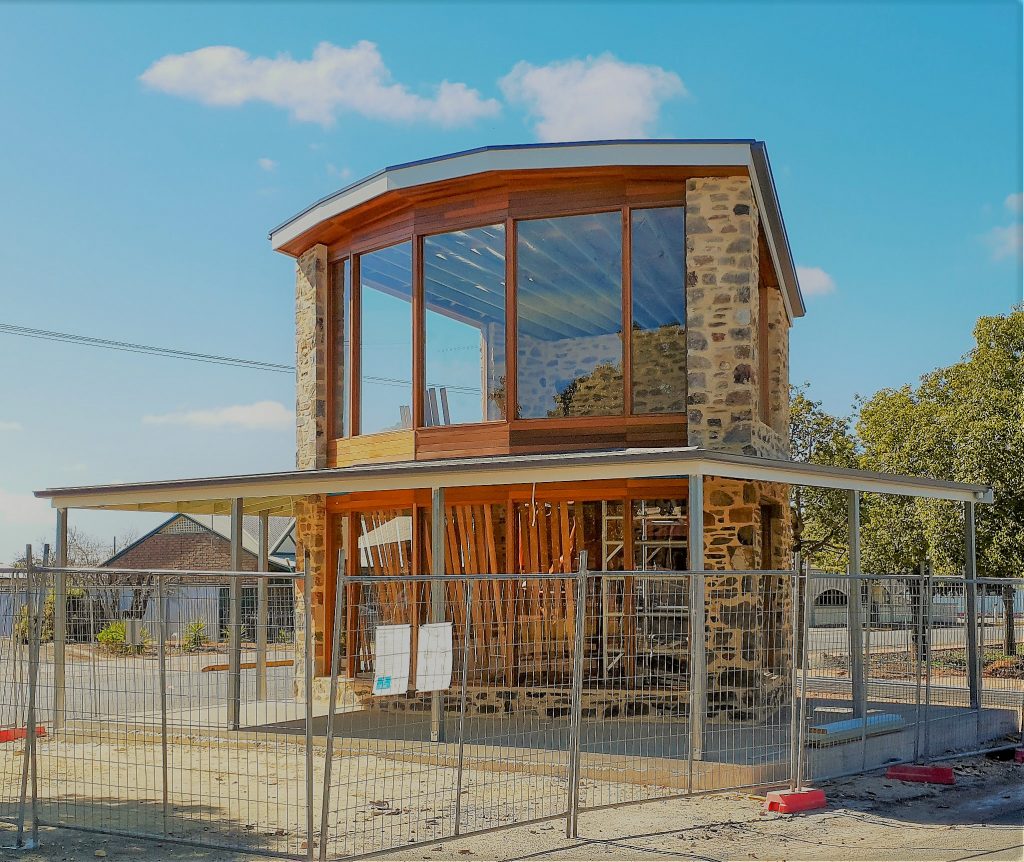
Wiradjuri Country
When bushfires move through towns placing lives, homes and income at risk, the emotional and financial recovery can take years. In the wake of the 2019/20 bushfires, many communities continue to feel stress and anxiety from the loss of employment and the trauma of evacuating and leaving their homes behind. In Tumbarumba, in New South Wales, many people lost their homes, sheds, fences, stock, and other assets in the fires creating a financial burden that has left much of the town physically and emotionally exhausted. However, the residents are trying to rebuild.
The members of local organisation Artists on Parade Co-op Ltd wanted to help their town reconnect to their home, and with each other after the fires. Thanks to a $7,000 grant from the VISY Tumut Region Recovery Fund, funded by The Pratt Foundation, Artists on Parade held 16 workshops over several weekends in October 2020.
Throughout the year, Artists on Parade are responsible for hosting exhibitions featuring local artists. Their gallery space is often used for community activities and events. With access to this fantastic space, it became a perfect location for their hands on workshops to take place. Children, teenagers, and adults in the community participated in activities – not just art – that were specifically chosen to increase relaxation and inspiration among the attendees.
Artists on Parade wanted to ensure the residents of Tumbarumba didn’t miss out on interests and pursuits that were deemed as “non-essential” or “unnecessary” due to financial restraints. They therefore kept workshop fees low to allow as many people as possible to participate.
The workshops were a success, with 115 people from a wide demographic participating. The activities included pyrography workshops, canvas work, cardmaking, sketching, bike maintenance, pastel portrait painting workshops and cakes, coffee, and milkshakes as well.
The workshops provided a safe and relaxing space for the residents of Tumbarumba to gather and meet new people who have the same lived experiences. There were many examples of attendees meeting for the first time after realising they lived on the same street and had gone through very similar experiences in the fires. By the end of the workshops, they had started carpooling together to attend more sessions.
In addition to creating connections between the residents of Tumbarumba, many attendees were also able to take home a finished art piece to mark the occasion and close off a terrible year.

